Review: One Hand Clapping at the Burgess Foundation
-
Rob Spence
- 19th March 2013
-
category
- Blog Posts
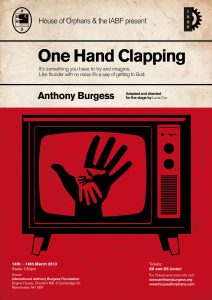
Anthony Burgess’s 1961 novel, One Hand Clapping, was one of the group of novels produced quickly in the so-called ‘terminal year’ following his return from colonial service with a suspected brain tumour. In it, Burgess satirises what he saw as the declining state of British culture as it aped American mores. One of the challenges for the House of Orphans theatre company, whose adaptation of the novel was staged at the Engine House on March 14-16, was how to translate his first person narrative into dramatic form. That they achieve this, triumphantly, is due to a sensitive and faithful adaptation of the text by director Lucia Cox, a quirkily eccentric stage setting by Meriel Pym, and three excellent performances by Oliver Devoti, Adam Urey, and especially Eve Burley as the main protagonists.
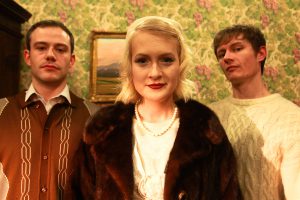
Janet Shirley, Burgess’s faux-naïve narrator, is necessarily centre-stage in the adaptation, carrying the burden of relaying the tale of her strangely gifted husband, Howard, whose photographic memory enables him to win a fortune on a TV quiz show. They escape the confines of their council house in Bradcaster, deftly suggested by a few items of furniture and some flowery wallpaper, to journey around the world on their winnings. But Howard’s destructive urges, born of disgust with the modern world, are outlined in some rambling thoughts he commissions the poet Redvers Glass to versify. The resourceful Janet resists the future planned for her by Howard, and the play really captures the black humour of the novel as she relates their story.
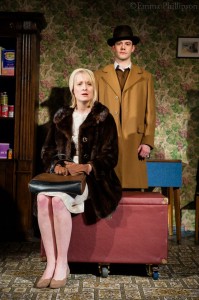
The adaptation relies heavily on Eve Burley’s straight-to-the-audience narration, which she carries off brilliantly: she is onstage throughout, first seen on a retro TV screen, then emerging to set the scene, and breaking away from the action periodically to propel the narrative forward. She manages Janet’s movement from schoolgirl innocent to steely, assured maturity with great dexterity. Her growing awareness of her husband’s oddness, and her grim determination to preserve her new life are suggested economically, but utterly convincingly. The other actors are excellent too. Oliver Devoti’s OCD Howard is by turns comic and chilling, almost an automaton at times; and Adam Urey is cringeworthy as the Hughie Greene-like TV host Laddie O’Neill, and suitably pompous as the self-regarding Redvers Glass.
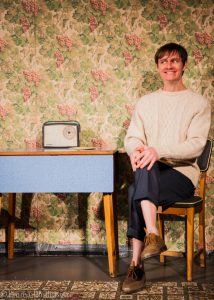
A noteworthy feature of the production was the evocative sound design, overseen by Owen Rafferty, which mixed snippets of early sixties popular music (Acker Bilk, Kenny Ball) with vintage advertisements on the TV. We also were treated to some of Ivor Cutler’s surreal songs, out of synch chronologically, but representative of the British sense of the absurd that was perhaps under threat from the bland Americanisation Howard loathes. The big room at the Engine House was packed for this intimate show, and it is to be hoped that there will be future opportunities for drama at the Burgess Foundation. I am sure that the enthusiastic audience at this production would welcome another Burgess adaptation. Tremor of Intent, anyone?
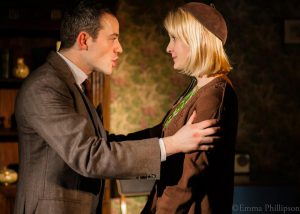
Rob Spence is Associate Head of English at Edge Hill University, and writes on Anthony Burgess and the literature of the twentieth and twenty-first centuries.


